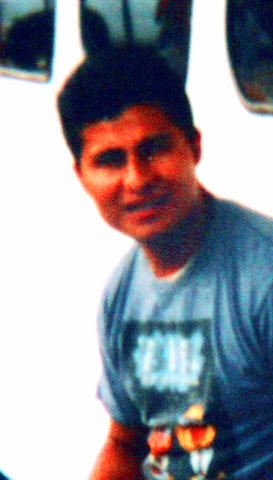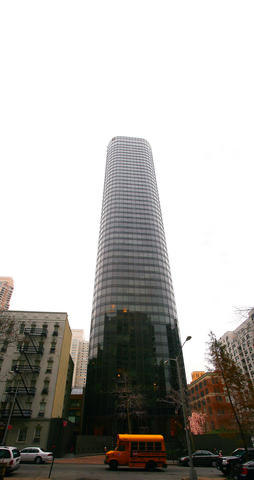Alcides Moreno plunged 47 stories that morning last month, clinging to his 91cm-wide window washer's platform as it shot down the dark glass face of an Upper East Side apartment building. His brother Edgar, who had been working with him on the platform, was killed.
Somehow, Alcides Moreno survived.
He was given roughly 11 liters of blood and 9 liters of plasma and underwent an operation to open his abdomen in the emergency room because, his doctor said, they did not want to risk moving him to an operating room. As December went on, he endured nine orthopedic operations.

PHOTO: NY TIMES NEWS SERVICE
Yet somehow, Alcides Moreno, the man who fell from the sky, survived.
In his hospital room, amid all the machines that helped keep him alive, his wife, Rosario Moreno, lifted his hand again and again to stroke her face and her hair, hoping against hope that a simple tactile sensation would remind him, would help bring him back.
Then on Christmas Day, Alcides Moreno reached out - and stroked the wrong face.

PHOTO: NY TIMES NEWS SERVICE
"Apparently he tried to do it to one of the nurses," Rosario Moreno said on Thursday, describing how she chided him, gently, when she was told what had happened. "I looked at him and said, 'You're not supposed to do that. I'm your wife, you touch your wife.'"
For the first time since the accident on Dec. 7, he spoke.
"He turned around and, in English, said, 'What did I do?'" she said. "It stunned me because I didn't know he could speak."
Surrounded by doctors who had helped save her husband, Rosario Moreno told her story at a news conference at which medical professionals with long years of experience in treating traumatic injuries used words like "miraculous" and "unprecedented" to describe something that seems remarkable: a man who fell nearly 152m into a Manhattan alleyway is now talking and, with a little more luck, a few more operations and some rehabilitation therapy, may well walk again.
"If you are a believer in miracles, this would be one," said Philip Barie, the chief of the division of critical care at New York-Presbyterian Hospital/Weill Cornell Medical Center in Manhattan, where Alcides Moreno, 37, is being treated.
"We are very pleased - dare I say astonished? - at the level of recovery that this patient has enjoyed so far," he added, "and although there is more work to be done, we are very optimistic for his prospects for survival."
Optimistic though they were, the doctors tempered their discussion of Moreno's prospects with some pragmatism. He was to undergo surgery yesterday to stabilize his spine. Sometime after that, he faces another orthopedic operation. Then there will be long months in rehabilitation.
But they predicted that his recovery would be complete in about a year.
Asked at the press conference whether Moreno would walk again, Barie said, "We believe so, yes." He noted that Moreno's pelvis had not been injured in the fall. Barie also said that all the injuries to Moreno's legs - some 10 fractures - had been "repaired" except one.
"Our goal is not just survival, but functional survival," he said.
Still, Barie suggested that Moreno had taken the team treating him into largely uncharted medical territory. Barie said Moreno's medical team had had no experience with someone who had fallen so far. He said that falls from even three stories can be fatal if the victim hits his or her head on landing.
"Above 10 stories, most of the time we never see the patients because they usually go to the morgue," Barie said, though he added that the staff at New York-Presbyterian/Weill Cornell had treated - and had written a medical-journal article about - a patient who survived a 19-story fall, less than half the distance Moreno fell.
"This is right up there with those anecdotes of people falling out of airplanes and surviving, people whose parachutes don't open and somehow they manage to survive," Barie said in an interview after the news conference. "We're talking about tiny, tiny percentages, well under 1 percent, of people who fall that distance and survive."
But Moreno, of Linden, New Jersey, confounded the odds from the beginning. He was sitting up when firefighters arrived at the building, the Solow Tower, at 265 East 66th Street. He was "on the borderline of consciousness" when he was wheeled into the emergency room, Barie said, despite serious injuries to his brain, his spine, his chest and his abdomen, along with several fractured ribs, a broken right arm and two broken legs.
Rosario Moreno said her husband's determination had not vanished that day. "If anything, he keeps me going," she said.
A moment later she added: "He wants to go to rehab. He wants to start walking." She also said she had told him he was not going back to his old job.
"I keep telling him, 'I love you,'" she said at the press conference. A moment later she added, "He keeps telling me it just wasn't his time."
She said their three children - ages 14, 8 and 6 - had visited their father, the two younger children only once. She said she had wanted to show them that "Mommy wasn't lying" and that "unlike Edgar, he's alive." But she said the visit was a particularly emotional moment for her husband because their youngest child, Andrew, "looks just like" Edgar Moreno.
Rosario Moreno said her husband apparently knew all along that his brother had died. She said that she did not tell him, but he mentioned it on Tuesday night. "He doesn't remember much about that day other than his brother passed," she said.
A full explanation for how the man survived, while his brother died, remained elusive. One theory is that Edgar Moreno, 30, was thrown from the platform as it sped toward the ground. One official who was at the scene said that part of Edgar Moreno's body was under the platform when rescuers arrived. But Barie also noted that Alcides Moreno had landed without striking his head.
Rosario Moreno was asked more than once at the press conference why she believed her husband had survived. "He was trained," she said. "He knew what to do with the platform" - meaning, according to other window washers, lie flat and ride it down.
But she also hinted that he was all too aware of the risks of the job. "Even knowing about his brother, not a tear came down, and they were very close," she said. "They lived together. They did everything together."
Rosario Moreno said she did not know if her husband and brother-in-law had been worried about the safety of their scaffold that day. After the accident, another family member who is also a window washer, Jose Cumbicos, said they had mentioned their misgivings in a telephone call that morning. Cumbicos also said that the Morenos' supervisor had reassured them, saying a mechanical problem with their rig had been taken care of.
At least three agencies are investigating the accident.

June 23 to June 29 After capturing the walled city of Hsinchu on June 22, 1895, the Japanese hoped to quickly push south and seize control of Taiwan’s entire west coast — but their advance was stalled for more than a month. Not only did local Hakka fighters continue to cause them headaches, resistance forces even attempted to retake the city three times. “We had planned to occupy Anping (Tainan) and Takao (Kaohsiung) as soon as possible, but ever since we took Hsinchu, nearby bandits proclaiming to be ‘righteous people’ (義民) have been destroying train tracks and electrical cables, and gathering in villages

Dr. Y. Tony Yang, Associate Dean of Health Policy and Population Science at George Washington University, argued last week in a piece for the Taipei Times about former president Ma Ying-jeou (馬英九) leading a student delegation to the People’s Republic of China (PRC) that, “The real question is not whether Ma’s visit helps or hurts Taiwan — it is why Taiwan lacks a sophisticated, multi-track approach to one of the most complex geopolitical relationships in the world” (“Ma’s Visit, DPP’s Blind Spot,” June 18, page 8). Yang contends that the Democratic Progressive Party (DPP) has a blind spot: “By treating any

Swooping low over the banks of a Nile River tributary, an aid flight run by retired American military officers released a stream of food-stuffed sacks over a town emptied by fighting in South Sudan, a country wracked by conflict. Last week’s air drop was the latest in a controversial development — private contracting firms led by former US intelligence officers and military veterans delivering aid to some of the world’s deadliest conflict zones, in operations organized with governments that are combatants in the conflicts. The moves are roiling the global aid community, which warns of a more militarized, politicized and profit-seeking trend

This year will go down in the history books. Taiwan faces enormous turmoil and uncertainty in the coming months. Which political parties are in a good position to handle big changes? All of the main parties are beset with challenges. Taking stock, this column examined the Taiwan People’s Party (TPP) (“Huang Kuo-chang’s choking the life out of the TPP,” May 28, page 12), the Democratic Progressive Party (DPP) (“Challenges amid choppy waters for the DPP,” June 14, page 12) and the Chinese Nationalist Party (KMT) (“KMT struggles to seize opportunities as ‘interesting times’ loom,” June 20, page 11). Times like these can